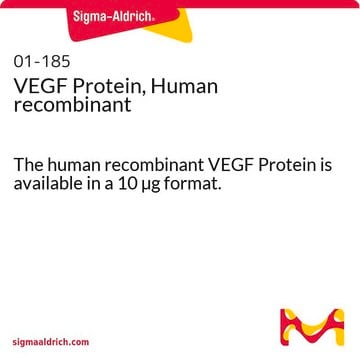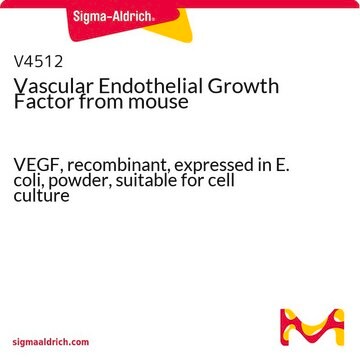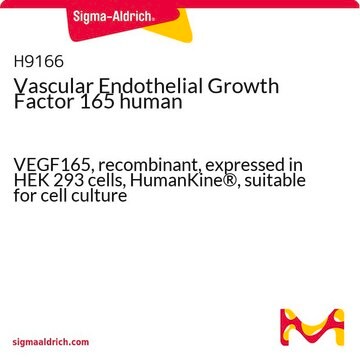GF315
Vascular Endothelial Growth Factor 165 human
animal free, >98% (SDS-PAGE and HPLC), recombinant, expressed in E. coli, suitable for cell culture
Synonym(s):
Vascular Endothelial Growth Factor 165, VEGF-165, VEGF, Vascular Endothelial Growth Factor, VEGF-A
About This Item
Recommended Products
product name
VEGF165 Protein, Human Recombinant Animal Free, The Vascular endothelial growth factor (VEGF or VEGFA) is a potent mediator of both angiogenesis & vasculogenesis in the fetus & adult. Manufactured using all non-animal reagents.
Quality Level
Assay
>98% (SDS-PAGE and HPLC)
impurities
<0.1 μg/mg protein endotoxin (<1EU/μg)
NCBI accession no.
UniProt accession no.
shipped in
dry ice
General description
Specificity
Mouse, Rat, Pig, Hamster, Trout, Green Algae, Sheep, Cow, Rabbit, Guinea Pig
Application
Stem Cell Research
Growth Factors & Receptors
Quality
Physical form
Storage and Stability
Disclaimer
Storage Class Code
11 - Combustible Solids
WGK
WGK 1
Flash Point(F)
Not applicable
Flash Point(C)
Not applicable
Certificates of Analysis (COA)
Search for Certificates of Analysis (COA) by entering the products Lot/Batch Number. Lot and Batch Numbers can be found on a product’s label following the words ‘Lot’ or ‘Batch’.
Already Own This Product?
Find documentation for the products that you have recently purchased in the Document Library.
Our team of scientists has experience in all areas of research including Life Science, Material Science, Chemical Synthesis, Chromatography, Analytical and many others.
Contact Technical Service






